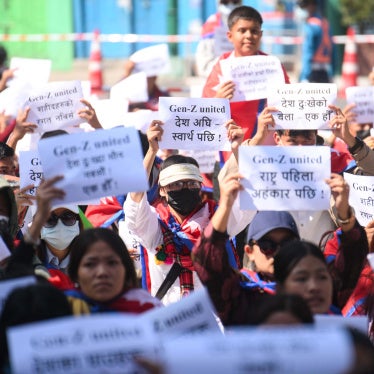Nobel Prize-winning economist Amartya Sen, known for his work on poverty and hunger, has written that the best policy to prevent famine is a free press. Exposing the truth is more than half the battle when it comes to averting famine.
In many ways, the same is true of HIV/AIDS. The deadly epidemic thrives best where it can be shrouded in secrecy, where inaction or counterproductive actions by governments can be hushed up, and where the needs of those at risk and those living with the disease can be swept under any available carpet.
Despite government promises of increased openness post-SARS epidemic, secrecy continues to be a hallmark of AIDS in China, where tens of thousands, maybe a million, maybe more -- impossible to know for sure -- have been stricken with HIV because officials conspired with private businesses to cash in on the highly profitable blood plasma of poor rural people. Some of those living with AIDS have been harassed and arrested for demanding that the state provide care and treatment. Stigma and abuse heighten the HIV risk faced by millions of other Chinese. And people courageous enough to speak out about the epidemic may land themselves in detention.
The government has taken some positive steps in recent years. State agencies have launched some small-scale AIDS education and HIV prevention projects in the provinces and cities. Beijing has made positive policy statements about non-discrimination, though these lack the force of law.
But these important steps don't go far enough. So many of HIV's potential victims are virtual sitting ducks, thanks to the Chinese government. Injection drug users face the highest risk and, according to a recent Human Rights Watch investigation, anti-drug policies add to that risk. Drug users are vilified, arrested and detained without due process. They're also forced to undergo repressive and ineffective detoxification "treatment" that includes chanting of state-approved slogans. Detainees in detoxification centres are forced to labour without pay, making trinkets for tourists. Drug users not in detention are driven underground by fear and harassment. These abuses fling open the doors for HIV/AIDS to rush into the drug-using population. And the story is similar for sex workers and men who have sex with men, forced to live in secrecy or on the margins of society.
For parts of the world where the AIDS epidemic is younger than in Africa or the United States, there is always the hope that lessons painfully learned in those places will benefit governments confronting newer epidemics. Here are some of the lessons: Universally available information and openness about the basics of HIV transmission, and care and compassion for people with AIDS, are a sine qua non.
With every instance of abuse and repression against injection drug users, sex workers, and others at risk, those persons are marginalized and driven away from prevention services, and the virus gains a stronger foothold. But these lessons have been ignored in China.
Even farmers have been turned into sitting ducks. The blood scandal -- China's own Plasmagate -- may turn out to be the biggest boost any government ever gave to HIV/AIDS in the history of the epidemic. After extracting the profitable plasma, blood collection centres run by Henan province officials pooled the remaining blood and re-injected it in the arms of donors, enabling them to give blood often without becoming anemic. The state spread HIV/AIDS across Henan -- and government documents reveal this also happened in six other provinces -- but not one official has yet been prosecuted for one of the world's worst blood scandals.
There has been one exception: In August, Henan province health official Ma Shiwen was thrown in jail, but for "circulating state secrets" or allegedly sending an official government report on HIV/AIDS to Chinese AIDS activists. Beijing must launch a full investigation, punish those responsible, and give treatment and compensation to the victims.
Beijing officials do not have to go as far as Africa or the United States to study positive practices. They could start by visiting Hong Kong. Hong Kong offers subsidized antiretroviral drugs and medical care to all residents with HIV/AIDS. Hong Kong also has a Disability Discrimination Ordinance that protects them against discrimination, an Equal Opportunities Commission where victims of discrimination can seek redress, and a vibrant community of AIDS organizations.
Some of these Hong Kong organizations want to take their decades of AIDS experience into the mainland, but have difficulty because of the culture of fear and secrecy in mainland China. Endorsement of these programs by Beijing would make a dramatic difference.
It is time for the curtain of secrecy to be drawn open on AIDS in China. A national AIDS strategy based on repression and fear will fail unless its goal is the biggest AIDS epidemic in history.
Joanne Csete is Director of the HIV/AIDS and Human Rights Program at Human Rights Watch.








